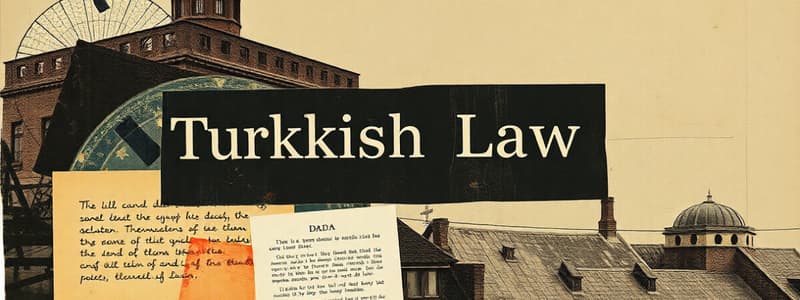Podcast
Questions and Answers
Which of the following is NOT considered a source of Turkish law?
Which of the following is NOT considered a source of Turkish law?
- Public Opinion (correct)
- Customary Law
- Doctrine (Books of Authority)
- Legislation
What is the correct hierarchy of enacted laws in the Turkish legal system starting from the highest?
What is the correct hierarchy of enacted laws in the Turkish legal system starting from the highest?
- Codes and Statutes, ByLaws, Presidential Decrees
- Presidential Decrees, International Treaties, Constitution
- Constitution, Codes and Statutes, International Treaties (correct)
- International Treaties, ByLaws, Codes and Statutes
Which of the following methods of interpretation focuses on the historical context of a law?
Which of the following methods of interpretation focuses on the historical context of a law?
- Teleological Interpretation
- Grammatical Interpretation
- Logical Interpretation
- Historical Interpretation (correct)
Which branch of the law does customary law NOT typically function within?
Which branch of the law does customary law NOT typically function within?
What is the primary function of court decisions within the Turkish legal system?
What is the primary function of court decisions within the Turkish legal system?
Which of the following is a characteristic of legislation in the Turkish legal system?
Which of the following is a characteristic of legislation in the Turkish legal system?
What is one of the methods of interpretation used in Turkish law?
What is one of the methods of interpretation used in Turkish law?
Which of the following sources of law is primarily based on societal norms and practices?
Which of the following sources of law is primarily based on societal norms and practices?
Which type of decree is issued in a state of emergency within the Turkish legal system?
Which type of decree is issued in a state of emergency within the Turkish legal system?
Which of the following is NOT a recognized court in the Turkish legal system?
Which of the following is NOT a recognized court in the Turkish legal system?
Flashcards are hidden until you start studying
Study Notes
Sources of Turkish Law
- Customary Law: Based on long-standing practices and beliefs, recognized by the state
- Antiquity: Exists for a long time
- Continuity: Consistently practiced
- Popular Belief: Widely accepted as right and just
- State Sanction: Officially recognized by the government
- Agreement with Statutory Law: Doesn't contradict written law
- Function in Criminal Law: Punishes offenders based on customary norms
- Function in Commercial Law: Regulates commercial transactions based on tradition
- Function in International Law: Influences international relations based on established customs
Legislation in the Turkish Legal System
- Hierarchy of Enacted Laws:
- Constitution: The supreme law of the land
- Codes and Statutes: Detailed laws on specific subjects
- International Treaties: Agreements between Turkey and other countries
- Presidental Decrees: Issued by the president, particularly in emergencies
- Decrees Issued in State of Emergency: Temporary measures during exceptional circumstances
- Presidental Decrees: Used for various purposes within the president's authority
- Bylaws: Regulations issued by local governments
Methods of Interpretation
- Grammatical Interpretation: Analyzing the literal meaning of words and phrases
- Logical Interpretation: Understanding the intent of the law based on its overall structure
- Historical Interpretation: Examining the purpose and context of the law when it was created
- Teleological Interpretation: Focuses on the intended purpose or goal of the law
Court Decisions
- Precedents: Not binding in Turkish law but influential in legal decision-making
- Constitutional Court: Protects fundamental rights and ensures the constitution is upheld
- Court of Cassation: Reviews lower court decisions for legal errors, ensuring uniformity in legal interpretations
- Council of State: Deals with disputes about administrative actions, ensures government acts are legal
- The Court of Accounts: Reviews public finances and investigates potential financial irregularities
- Court of Conflicts: Resolves disputes between judicial bodies
Sources of Turkish Law
- Customary Law:
- Origin: Ancient Practices
- Requirements: Continuously followed, believed to be just, sanctioned by the State, and aligns with statutory law
- Function: Used in various branches of law, like criminal, commercial, and international law
- Legislation:
- Hierarchy:
- Constitution - Foundation of the legal system
- Codes and Statutes - Detailed laws covering specific areas
- International Treaties - Agreements with other countries
- Presidential Decrees:
- State of Emergency: Issued during emergencies
- Normal Conditions: Issued in typical circumstances
- ByLaws: Local regulations
- Interpretation:
- General Principles: Seeking the true meaning of the law
- Methods:
- Grammatical: Literal interpretation of words
- Logical: Understanding the law's underlying logic
- Historical: Considering the law's origins and context
- Teleological: Focusing on the law's purpose
- Enforcement: Legislations must be applied correctly
- Repeal: Laws can be abolished when no longer needed
- Hierarchy:
Court Decisions
- Precedents in Turkey: Past court decisions influence future cases
- Key Courts:
- Constitutional Court: Ensures the constitution is followed
- Court of Cassation: Court of last resort for civil and criminal cases
- Council of State: Deals with administrative law
- Court of Accounts: Supervises public finances
- Court of Conflicts: Solves legal disputes between different jurisdictions
Doctrine (Books of Authority)
- Expert Opinions: Legal scholars' writings and analyses
- Influence legal debates and interpretations.
Studying That Suits You
Use AI to generate personalized quizzes and flashcards to suit your learning preferences.




